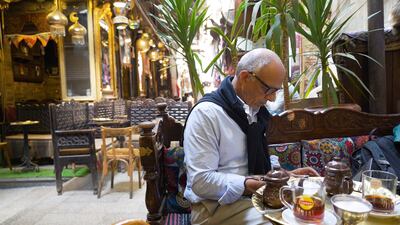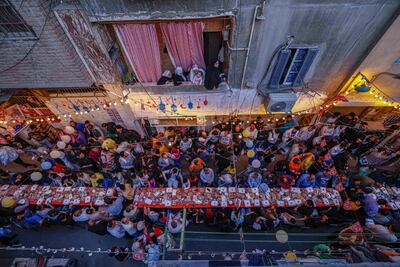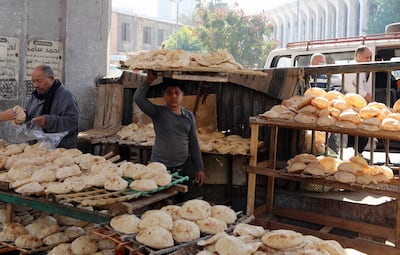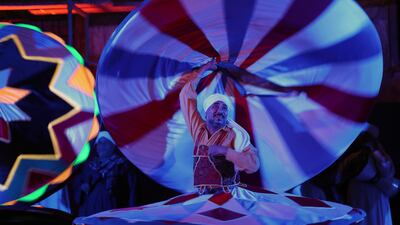On so many levels, landing a reporter’s job in Cairo is a dream.
With its more than 20 million people and a generous dose of chaos and low-level lawlessness, Egypt’s capital is a monster that can wear you out, even drive you spare at times.
But it just keeps on giving, although only to the most earnest, curious and passionate of journalists.
The National’s team of reporters in Cairo are the perfect fit for the city.
Reporters Kamal Tabikha and Nada El Sawy, video-journalist Mahmoud Nasr and myself have worked together for a little more than two years.
I think it’s a fair assessment to say that our coverage provides a comprehensive and insightful look at life in Cairo, from the dynamics of its day-to-day challenges and vibrant art scene to archaeology and economy.

But Cairo is a city with a knack of challenging cliches and stereotypes.
The Nile-side sprawling metropolis is a place of contrasts, surprises and heart-wrenching divides.
In countless ways, it has profound contempt for anyone who has the audacity to claim to understand it. Yet, and despite its cruel ways, it never ceases to charm.
I started working for The National in early 2019 after three decades in wire service journalism that took me to 25 countries across the Middle East, Africa, Europe and Asia.
For me, the paper was a much-needed new beginning, a second wind if you like, that rekindled my passion for my profession.
What made working for The National special was that the paper focused on the region and took its mantra seriously: The Middle East Explained. Gone were the constraints on length and the proverbial “will the Kansas milkman want to read this?” threshold.
With The National, the milkman from America’s mid-west is not factored in, but relevance and interest are. Local news with the right context and written with flair is in demand.
The paper often provides the key details needed to understand the big picture.
To do that in a city that often appears unhinged under the pressure of overpopulation, economic disparities and a multitude of divisive social and religious issues just made everything much more interesting for me.
“Cairo is not an instantly understood city,” says Tabikha, 30, a graduate of the American University in Cairo.
“At times it’s beautiful and at times obscene.
“But I think that makes for great journalism.
“The sheer size of the city and the large number of people living in it means that there is always something to write about.”
Egyptians have a natural storytelling talent, something that has made reporting more intriguing and revealing for Tabikha.

“I love that I could be out on the streets interviewing a rice seller about price hikes and get to hear a story about how his brother swindled him out of his inheritance,” he said.
“These peripheral narratives are invaluable to understanding how Cairo ticks and how its drama unfolds.”
El Sawy, 43, an Egyptian-American mother of three with a postgraduate journalism degree from New York’s Columbia University, was a personal finance reporter in The National’s Abu Dhabi office before arriving in Cairo in July 2020 to take up a role as a general news reporter.
She has since left her mark with a wide and diverse range of feature stories that have covered archaeology, fashion, arts and, of course, finance.
Her interviews with newsmakers such as world famous heart surgeon Sir Magdi Yacoub, trend-setting jewellery designer Azza Fahmy and Paris-based opera singer Farrah El Dibany were massive and readable gets.
“As a Cairo correspondent, I have got the chance to do a bit of everything for the foreign desk, business and arts and culture sections,” El Sawy says.
“Much like the city, the process of finding stories can be chaotic at times.
“I’m on various WhatsApp groups, with press releases coming in on a daily basis. But the real stories are not in the carefully crafted summaries with opaque wording and few details.”

El Sawy is unforgivingly well-organised and methodical, and recognised as one of Egypt’s top long-distance runners. She brings those valuable qualities to the job, with stories that leave no question unanswered.
In the mess that Egypt’s economy is currently in, she has found a glimmer of hope in the young men and women who risked everything to see their ideas put to the test in start-ups.
Her series of profiles of such fledgling companies are readable, relatable and, unintentionally, give those behind these infant enterprises a measure of publicity that helps them carry on.
Nasr, 28, the bureau’s relentless video journalist who has a degree in psychology from the University of Alexandria, is the team member who has the unenviable task of dealing with authorities, who sometimes see a serious and imminent threat in every camera.
“Being a video journalist in Egypt isn’t an easy task,” he says, understating the challenges he faces along with others in his profession on virtually every story that requires being out on the streets.
But Nasr, as a journalist, brings to his job something a great deal more sophisticated than just shooting a video.
He has his own theory about reporting and it speaks to Cairo’s social disparities, the struggle of almost every resident to make ends meet and how Cairenes of all walks of life and social status interact with one another.

“Cairo, like elsewhere in Egypt, has a variety of environments and communities that members of my generation call bubbles,” he says.
“Being a video journalist living among these bubbles means there is a seemingly endless number of complex stories that I can tell.
“The common thread between all these stories is survival.
“Survival is an act that everyone does differently. Getting food every day for your family is survival, staying positive is survival.
“And it is not just about humans. Cultures, music and memories also strive to survive.”


